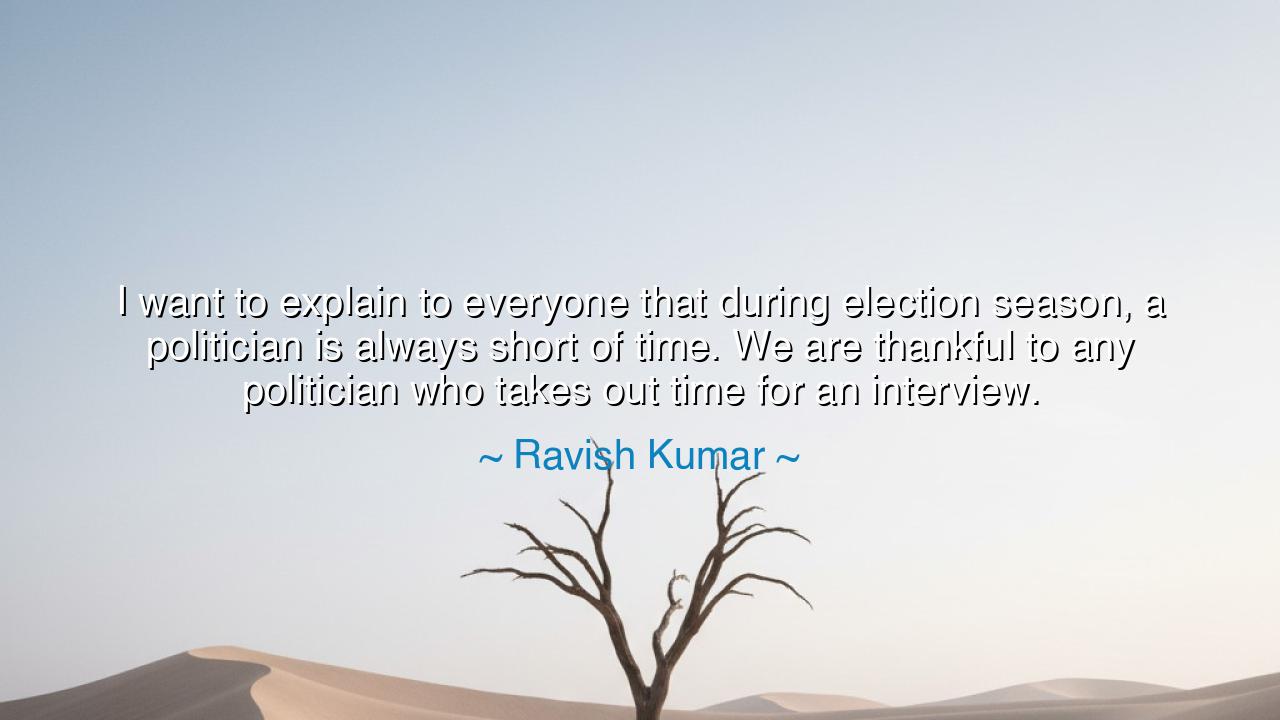
I want to explain to everyone that during election season, a
I want to explain to everyone that during election season, a politician is always short of time. We are thankful to any politician who takes out time for an interview.






Ravish Kumar once declared with clarity and humility: “I want to explain to everyone that during election season, a politician is always short of time. We are thankful to any politician who takes out time for an interview.” Though these words belong to the modern world of democracy and journalism, they echo with the rhythm of an ancient truth: that those who hold power, pressed by duties and ambitions, often guard their hours as treasures. To receive even a portion of their attention is not a small thing, for in that moment, the voice of the people may speak, and accountability may be demanded.
The ancients, too, understood the weight of time for rulers. In Rome, senators and consuls carried the burden of countless appeals, judgments, and wars, and to meet them even briefly was considered a gift of fortune. The philosopher Seneca wrote that time is the most precious resource of all, for while wealth may be hoarded and armies amassed, the hours of life are fleeting, never to return. Ravish Kumar’s thankfulness reflects this timeless awareness—that to secure the presence of a politician, even for a short interview, is to capture a rare and fleeting opportunity to ask questions that matter.
Yet his words carry not only gratitude but also subtle wisdom. For they remind us that politicians in election season are consumed by their pursuit of power, racing from rally to rally, from promise to promise. To pause, to sit, to answer, is to momentarily break from the theater of speeches and engage in the discipline of dialogue. This is no small victory for the people, for in that pause the mask of rhetoric may be lifted, and truth may be glimpsed. Thus, Kumar’s statement is not flattery—it is recognition of the hard reality that access to power is difficult, and therefore must be treasured when granted.
Consider the story of Abraham Lincoln, who during the great trial of the American Civil War often met with ordinary citizens and journalists. His time was scarce, yet he believed that giving even a few minutes could carry immense value, for in those moments he could hear the voice of the people directly and explain his vision. To secure such interviews was a mark not of convenience but of trust. Like Lincoln, the politician who spares time during the frenzy of elections reveals something of their character—whether humility, accountability, or respect for the press and the public.
The deeper meaning of Kumar’s words lies in the relationship between power and patience. In times of ambition, when leaders are pulled in countless directions, time becomes the currency of sincerity. Promises shouted from a stage may stir the crowd, but the willingness to sit for questions shows a greater respect for truth. To be thankful for such moments is to recognize their rarity and their potential to shape public thought.
The lesson, then, is clear. To the journalist: cherish every moment you secure with those who hold power, and use it not for flattery but for truth-seeking. To the citizen: understand that access to your leaders is precious, and demand that they show themselves, not only in the blaze of rallies but in the quiet fire of questioning. And to the politician: remember that giving your time is not a loss but a gift, for in those moments you prove your willingness to serve, not only to speak.
Practical counsel may be taken. Journalists must prepare for such interviews with diligence, asking what the people cannot, pressing with courage but also listening with fairness. Citizens must support this work, valuing truth above spectacle. And politicians must remember that history honors those who gave their time to the people, not only their speeches to the crowd.
Thus, Ravish Kumar’s words endure as a reminder: “We are thankful to any politician who takes out time for an interview.” For in that brief exchange of questions and answers lies the beating heart of democracy—the dialogue between power and people, fleeting in moments, yet eternal in its consequence.






AAdministratorAdministrator
Welcome, honored guests. Please leave a comment, we will respond soon